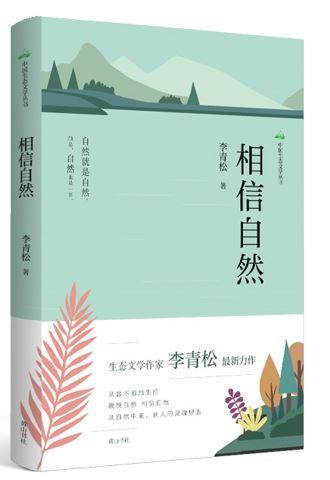In recent years, the creation of natural literature has become a hot topic. Many writers take the initiative to intervene in natural literature, using works of different themes to write stories between man and nature, and reflect on the relationship between man and nature. Li Qingsong is undoubtedly the backbone, just as the name suggests, he is destined to be associated with natural literature. His recently published ecological literature work "Believe in Nature" expresses his new views on nature and literature in different ways of narrative, lyricism and discourse.
As an influential natural literature writer in China, Li Qingsong has long been tirelessly writing literature around the theme of ecology and nature. "Believe in Nature" includes 29 non-fiction works, essays and essays on nature themes published by him in recent years, writing objects involving mountains, rivers, grasses, trees, animals, and legends and allusions related to nature, etc. Although the object of each article is nature, behind the text is a writer's deep love of nature.
"We think we are in control of everything, but in fact, it is nature that dominates everything." In Li Qingsong's eyes, nature cultivates tenacity and legend, as well as love and beauty. Nature is a community of life to which man also belongs. Our lives, past, present, and future, cannot be stripped from nature and are always connected to the multitude of relationships of nature. Traces of nature are everywhere, including invention and creation, literature and art, and our minds and souls. To believe in nature is to believe in the beautiful and the sublime.

What is natural literature? Academically, there can be many interpretations, in short, but all literary works that use nature as the object of writing can be called natural literature. Literature is anthropology, but natural literature is the relationship between man and nature, man and all things.
As a writer of ecological literature, his keen observation and innate sense of surprise are the most basic abilities and qualities. The book "Believe in Nature" begins with "Halaha River". In the text, Li Qingsong has a close contact with the northern river, and uses vivid and warm brushstrokes to depict the forests, birds and beasts, fish, fishermen, the changing seasons and the indescribable and subtle beauty on both sides of the river in a realistic way. The depiction of animals is vivid and vivid, showing a strong writing skill. For example, write flower tail hazel chicken: "Flower tail hazel chicken is like a cone and small, black eyes, red eyebrow pattern, sharp claws, short legs." The body is long and long, the plumage is clear gray, and occasionally there are black-brown stripes. From a distance, like birch bark, it is not easy to spot. "Li Qingsong made literary portraits of animals, realistic and precise, and a strong sense of picture came to the face.
In nature, there are also some rare species that have attracted Li Qingsong's attention. It is not that such species are extremely valuable, but that these rare species play an important role in science in the origin and evolution of life on Earth. Metasequoia is known as the "living fossil" of the plant kingdom, and botanists have long believed that Metasequoia has long disappeared and can only be traced in fossils. But in The town of Moudao in Lichuan City, on the border of Hubei and Chongqing, there grows a 600-year-old Metasequoia tree. The discovery of this Metasequoia tree rewrote the history of plant evolution. In the article "Metasequoia King", Li Qingsong "established a biography" of Metasequoia in an all-round way through on-site interviews, observations and comparisons. For hundreds of years, this Metasequoia tree has survived various climatic disasters. In fact, the fate of the tree often has a certain secret coincidence with the fate of people, some of them leave the scene halfway, and some of them die. In front of a tenacious tree, people actually have nothing to be proud of, and trees are sometimes more tenacious and tenacious.
It is also written trees, and its perspective can be switched. Golden silk nan wood is a rare and precious tree species, has a supreme and beautiful temperament, not noisy, quiet and calm, unique in the world, known as "imperial wood". In the deep mountains of Zhuxi County, Hubei Province, this tree has always grown, and the nan wood here was transported to Beijing during the Ming Dynasty to repair the Forbidden City. In the article "Golden Silk Nanmu", Li Qingsong not only gave a popular narrative of what is golden silk nanmu, but also told the historical allusions related to jinsi nanmu. This kind of writing trees from the dual perspective of science and humanity immediately makes the literary image of the tree full and full.
In general, "Believe in Nature" tells the story of man and nature, and its revelation is multifaceted. In the face of nature, we must understand that heaven and earth have laws, the four seasons have rules, and all things have laws. We must learn to revere nature and live in harmony with nature. If nature is despised, desecrated, or destroyed, it is bound to be retaliated against by nature. Whether from the perspective of literary creation or ecological governance, natural literature has a long way to go, and excellent works can help the process of ecological civilization construction from the spiritual level. In this sense, the development and prosperity of natural literature in China is ushering in a historic opportunity.
For more information, please download the 21 Finance APP